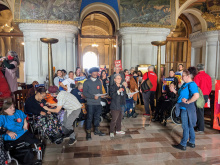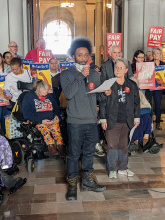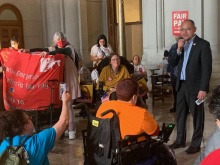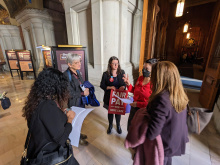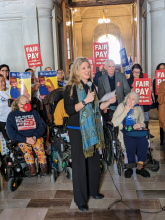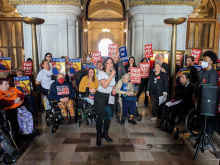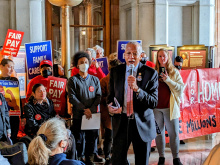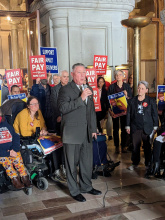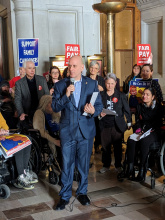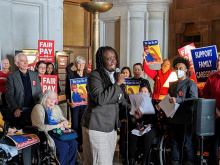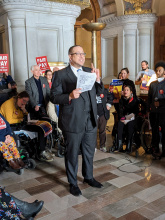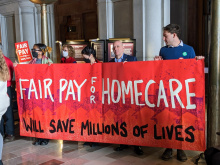CPC Joins the Community Homecare Consortium's Call for Full Funding of Home Care
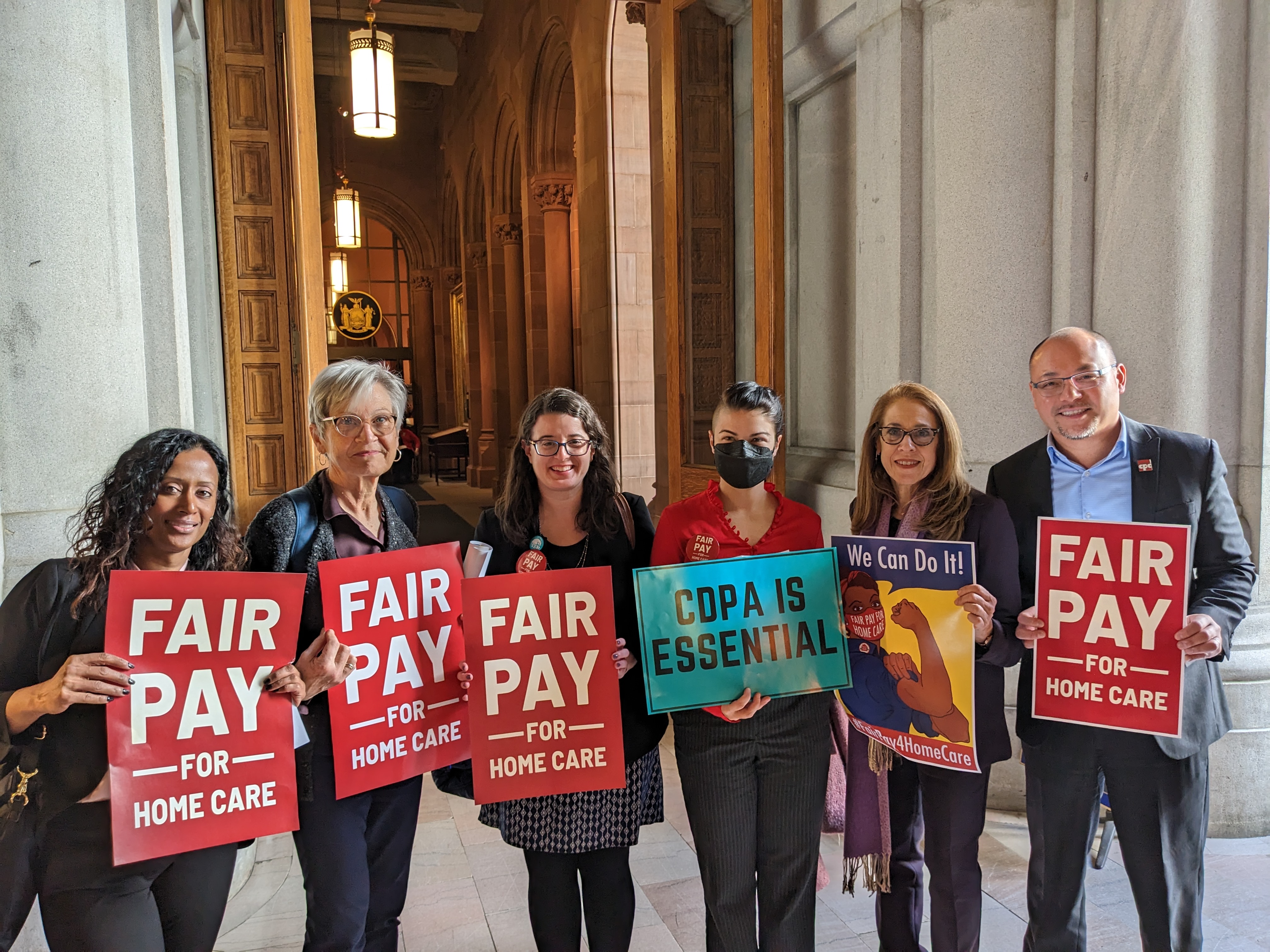
CPC joined the Community Homecare Consortium's State Advocacy Day on Monday, March 20th, 2023 in Albany. The Community Homecare Consortium includes 10 nonprofit home care agencies, including CABS Home Attendants Service, Inc, Chinese-American Planning Council Home Attendant Program, Inc, JASA Care, New York Foundation for Senior Citizens Home Attendant Services, Inc, RAIN Home Attendant Services, RiseBoro Home Care, Rockaway Home Attendant Services, Selfhelp Community Services, St. Nicks Alliance Home Care, and Sunnyside Community Services. Advocacy was supported by each member, NY Caring Majority, and United Neighborhood Houses.
The Fair Pay for Home Care rally included older adults, people with disabilities, advocates, and legislators, and CPC President and CEO Wayne Ho spoke on behalf of the Community Homecare Consortium. State Senators and Assembly Members, including Senator Rachel May, Senator Gustavo Rivera, Senator Cordell Cleare, Senator Robert Jackson, Assembly Member Harvey Epstein, Assembly Member Jessica Gonzalez-Rojas, Assembly Member Anna Kelles, Assembly Member Dana Levenberg, Assembly Member John McDonald III, Assembly Member Sarahana Shrestha, and Assembly Member Tony Simone, read letters from workers and clients on the need for the State to pay a living wage to home care workers.
The Consortium joined the Caring Majority in delivering over 8,000 letters in support of Fair Pay for Home Care to the Governor and met with State legislators, including Health Committee Chair Assembly Member Amy Paulin. The Consortium's advocacy agenda (download here) was given to every Senate and Assembly office, and members had a chance to speak with many legislators around the Capitol.
Community Homecare Consortium's FY 2023-2024 Policy Priorities:
1. Fully Fund Recent Home Care Wage Increases for Providers – While community-based home care providers were pleased to see investments in wage increases to home care workers in the FY 2022-23 Enacted Budget, because the full Fair Pay for Home Care bill was not implemented, these increases came without guaranteed full funding for providers. Instead, providers have had to rely on MLTCs and MCOs to adjust the rates, which have been insufficient for many providers and has created an untenable funding shortage for nonprofits. We urge the State to ensure that MCOs and MLTCs provide sufficient rates to cover these increases, and to pass the full Fair Pay for Home Care bill to ensure that future increases are covered.
2. Pass Fair Pay for Home Care – Nonprofit community-based home care providers work hard to ensure that the home care workers we employ are representative and reflective of the communities we serve. We believe the best care comes from providers who understand and represent the same values and cultural understandings of our communities and patients. We also believe that those providers are best able to deliver quality care when the value of their work is fully acknowledged through fair compensation. To combat the current and projected workforce shortages, improve wages in order to boost worker recruitment and retention, and meet growing demand, the legislature must pass Fair Pay for Home Care (S.3189 May/A- .TBD Paulin) and ensure it is fully funded in the State Budget. While the $3/hour raise over two years adopted in the FY 2022-23 budget is a good start, this legislation would raise home care worker pay to 150% of the regional minimum wage across the State. This investment in the home care workforce would wipe out the home care workforce shortage in less than five years – creating 20,000 additional home care jobs per year for the next decade.
3. Fully Fund 24-hour Home Care – The “13-hour rule” has been set and enforced by the State since the 1970s, and unfairly has home care workers assigned to unsafely long shifts without adequate compensation. Per this rule, home care workers are being assigned 24-hour shifts by Medicaid where they are only paid for 13 hours of work, with 8 hours of unpaid sleep time and 3 hours of unpaid meal time. NYS determines home care regulations and compensation from contracts with NYC Human Resources Administration (HRA), local agencies, MCOs and MLTCs; support by court decisions; and 1199SEIU union agreements. Home care agencies must comply with the Department of Labor (DOL) regulations and their contracts, which are funded from rates set by the Department of Health (DOH) using a formula based on a 13-hour work day (as originally set by DOL). In order to provide worker compensation for all hours on the job, ensure that patients get needed and adequate care in the least restrictive setting in accordance with the Olmstead Act, and not impose onerous reporting requirements on home health aides, we recommend that the State reimburse all 24 hours of a 24-hour shift. We are supportive of Assemblymember Epstein’s bill A.3145A of 2022 and Senator Persaud’s bill S.359A of 2022 which would end the 24-hour shift in favor of making 12-hour split shifts the industry standard. It is critical to ensure that this bill does not reduce care hours for patients and continues to provide care in the least restrictive setting, is fully funded, and makes allowances for certain cases where 24-hour continuous care is appropriate (such as in certain cases of dementia, or by live-in family caregivers), although those 24-hours should then be fully compensated, including breaks.
Download the full State Policy Agenda from the Community Homecare Consortium here.
Read more on CPC's efforts to reform home care here.


